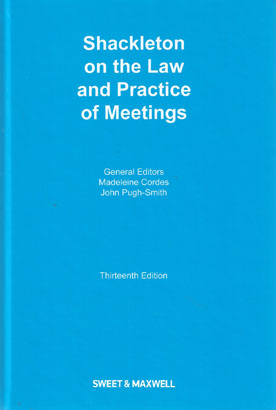
Shackleton is the indispensible guide to the law and practice of company and non-company meetings. It logically addresses the practicalities of organising all levels of meetings, from AGM to specialised committee, dispensing invaluable advice on all aspects of the processes involved: from selecting venues, preparation and convening, conduct and minute taking all the way through to adjournment.
The 13th edition also deals with the increasingly pertinent topics of defamatory statements, breach of the peace and director’s duties. As the essential reference guide in its field the book provides the information necessary to prepare, conduct and close a meeting essential to the every-day practice of legal professionals, company secretaries, administrators, directors, local authorities and all other organisations that hold formal meetings.